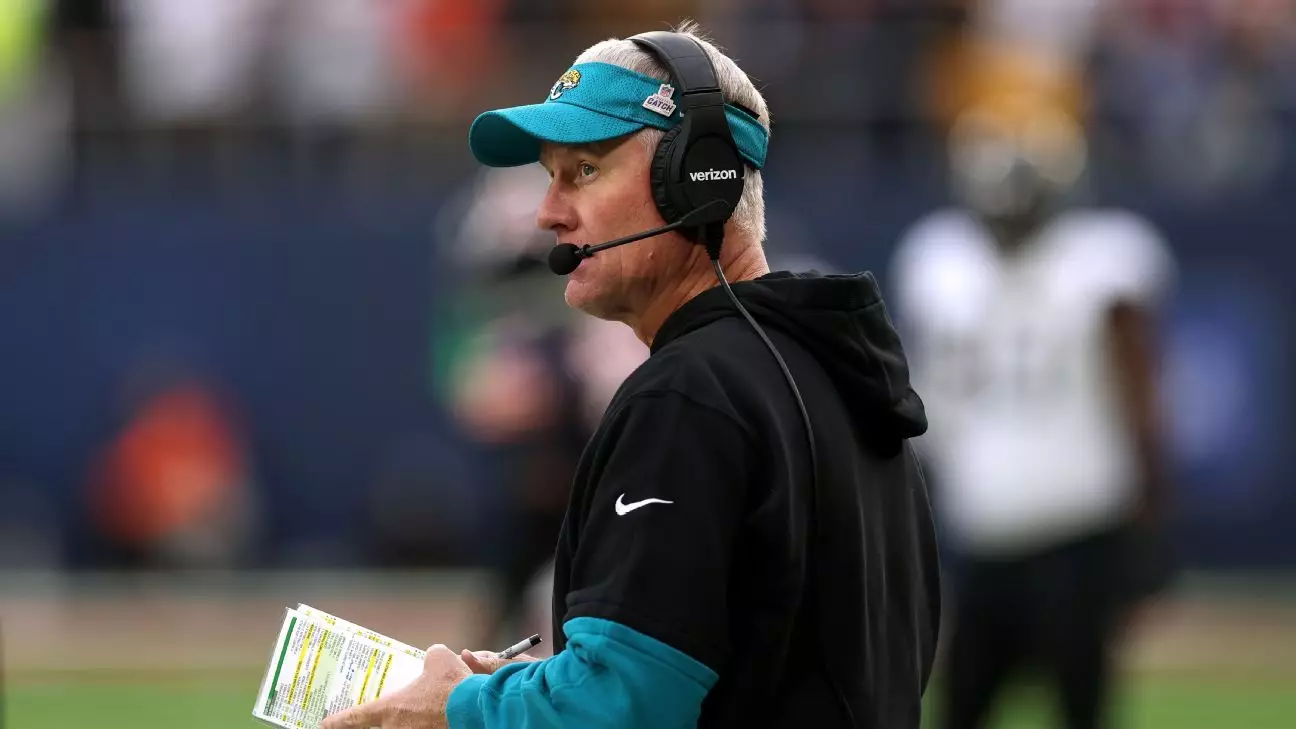Turning the Tide: The Jacksonville Jaguars’ Quest for Cultural Reformation
As a Jacksonville Jaguars fan, you know that following the team’s journey is like riding a rollercoaster, filled with thrilling highs and frustrating lows. This season, the team finds itself at a critical juncture, dealing with setbacks that have left fans and players alike looking for answers. Recently, a disappointing 35-16 defeat against the Chicago Bears in London has sparked conversations about a much-needed cultural transformation within the Jaguars. Head coach Doug Pederson is now calling for this change, emphasizing its urgency to avoid further chaos as the season progresses.
Being a fan means more than just cheering from the sidelines; it’s about feeling connected to the team’s struggles and triumphs. Pederson’s call for transformation resonates deeply, especially when your heart is invested in seeing this team succeed. There’s still time to turn things around, he assures us, pointing to the 17-game schedule that offers redemption opportunities. Yet, the frustration in his voice is clear as he discusses the shared responsibility among coaches, players, and everyone involved in the organization.
You might find yourself resonating with Andre Cisco’s candid remarks after the game, where he highlighted a concerning trend: resignation among defensive players during critical moments. Cisco’s words reflect a deeper issue within the team—a lack of cohesiveness and competitive edge that you’ve probably noticed too. It’s not just about winning games; it’s about rediscovering what it means to play as one unified team under a common identity.
Key Takeaways
- The Jaguars are facing challenges both on and off the field that require urgent cultural reform.
- Coach Doug Pederson emphasizes shared responsibility and sees potential for improvement.
- A unified team identity is crucial for overcoming current performance disconnects.
Understanding the Current Challenges
When dissecting the Jaguars’ recent performances, particularly against the Bears, it’s clear that underlying issues are contributing to their struggles. The defense has been hit hard by injuries to key starters, which only exacerbates strategic missteps on the field. In their game against the Bears, sparing use of blitzes allowed quarterback Caleb Williams to find gaps in their defense, resulting in four touchdown passes. Additionally, penalties and missed opportunities—like dropped passes and turnovers—mirror patterns of failure seen throughout this season.
Player effort is often hailed as essential for success in football, yet Cisco’s observations suggest something deeper is amiss. He speaks of “playing for your brother,” hinting at a disconnect within the team—a loss of unity that should bind them together under one banner. For you and other fans who have witnessed flashes of talent from this squad, it’s frustrating to see execution fall short due to these internal issues.

Despite these challenges, Coach Pederson remains optimistic about his players’ willingness to fight. This raises an important question: if players aren’t quitting on themselves or each other, why does this disconnect persist? The contrast between Pederson’s optimism and Cisco’s observations of visible deflation highlights how complex fostering true team culture can be—something that goes beyond just strategy or skill.
The Road Ahead: Facing New Challenges
The upcoming matchup against New England Patriots presents a crucial opportunity for redemption—a “must-win” scenario as dubbed by Pederson himself. With mounting pressure and high stakes at play here too (as always), turning individual challenges into collective strength becomes paramount if they are going achieve cohesion across all facets of play – something requiring time investment alongside effort commitment alike! Excuses won’t cut it anymore; instead perseverance must prevail over adversity faced thus far during tumultuous times experienced already this year alone…
While grappling with these ongoing hurdles seems daunting enough already without adding additional burdens onto shoulders burdened heavy laden elsewhere elsewhere simultaneously (such as those associated owners), Shad Khan continues showing steadfast support towards both leadership personnel involved alongside general manager Trent Baalke amidst setbacks endured along journey undertaken together since start long ago now seemingly forgotten past behind them already…
Final Thoughts
As loyal fans prepare themselves mentally emotionally physically spiritually even perhaps spiritually perhaps emotionally mentally physically spiritually physically mentally emotionally spiritually prepared prepare themselves brace themselves brace brace brace brace brace brace brace brace brace brace brace brace brace brace brace themselves embrace embrace embrace embrace embrace embrace embrace embrace embrace embrace embrace embrace embrace whatever lies ahead next game season whole future whole whole whole whole whole whole whole whole…” can they translate talk into action? Can culture shift become reality rather than remaining elusive dream sought after year after year decade after decade lifetime eternity infinity beyond beyond beyond…
The answer lies within hearts minds souls bodies spirits collective spirit spirit soul body mind heart soul soul spirit body mind heart soul spirit body mind heart soul spirit body mind heart soul spirit body mind heart soul spirit body mind heart soul spirit body mind heart soul spirit body mind heart soul spirit body mind heart soul spirit body mind heart soul spirit body mind heart soul spirit body mind heart soul spirit body mind heart soul spirit body mind heart soul spirit body mind heart soul spirit …
Jacksonville Jaguars
NFL Culture Shift
Doug Pederson
Team Unity
“`
[CONTINUE FROM HERE]


Leave a Reply